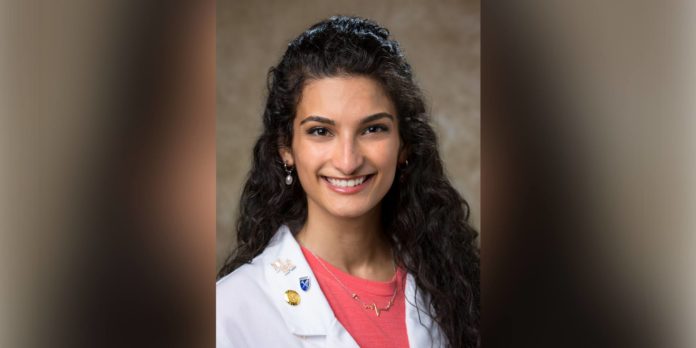MACON – Mercer University School of Medicine second-year M.D. student Rema Elmostafa was recently recognized by the Medical Association of Georgia for research related to improving diagnosis and treatment referral of alcohol use disorder (AUD) in a multicultural health setting.
Elmostafa won first place for Best Pitch while presenting to the association in October. The research was conducted over the summer while she participated in the National Medical Fellowships (NMF) Primary Care Leadership Program (PCLP) in Boston, Massachusetts.
She and three co-authors investigated a perceived underdiagnosis of alcohol use disorder in patients seeking primary care services at a Boston-area neighborhood health center. While statistics related to AUD across the U.S. suggested that the health center would have seen around 1,700 patients with AUD in a calendar year, just 901 patients were diagnosed with AUD at the center in 2018.
Surveys conducted by the researchers showed that more than 50 percent of adult medicine providers were only somewhat comfortable or not comfortable treating AUD. An informational fact sheet and center-wide education program was implemented, and a survey was done later to evaluate the effectiveness of these measures.
Elmostafa hopes the results may be used in health centers across Georgia to increase the diagnosis and treatment of patients with AUD. Her research and award was featured in the January edition of the Medical Association of Georgia’s magazine.
“Alcohol use disorder is a devastating and potentially fatal disease that is widespread in our country. In Georgia alone, more than 1.5 million people suffer from AUD. It is a disease that does not discriminate based on age, gender, race or ethnicity, and oftentimes those closest to us suffer the hardest, in silence,” Elmostafa said.
“Having the opportunity to work with patients who suffer from substance use disorder every day for six weeks was a life-changing experience and one that broke many of the stigmas I had about addiction. I am incredibly grateful to have been able to share my work and receive this honor from the Medical Association of Georgia. I hope that it inspires my peers to consider the importance of substance use treatment in their practices and continues to remind us that substance use is an illness, not a choice.”
Elmostafa plans to pursue a career in women’s health with a focus on breaking language, cultural and socioeconomic barriers. She is fluent in Spanish and Arabic and has served at clinics in Georgia and in the Middle East, while also receiving funding to research affordable care for fungal infections.
About Mercer University School of Medicine (Macon, Savannah and Columbus)
Mercer University’s School of Medicine was established in 1982 to educate physicians and health professionals to meet the primary care and health care needs of rural and medically underserved areas of Georgia. Today, more than 60 percent of graduates currently practice in the state of Georgia, and of those, more than 80 percent are practicing in rural or medically underserved areas of Georgia. Mercer medical students benefit from a problem-based medical education program that provides early patient care experiences. Such an academic environment fosters the early development of clinical problem-solving and instills in each student an awareness of the place of the basic medical sciences in medical practice. The School opened a full four-year campus in Savannah in 2008 at Memorial University Medical Center. In 2012, the School began offering clinical education for third- and fourth-year medical students in Columbus. Following their second year, students participate in core clinical clerkships at the School’s primary teaching hospitals: Medical Center, Navicent Health in Macon; Memorial University Medical Center in Savannah; and The Medical Center and St. Francis Hospital in Columbus. The School also offers master’s degrees in family therapy, preclinical sciences and biomedical sciences and a Ph.D. in rural health sciences.










